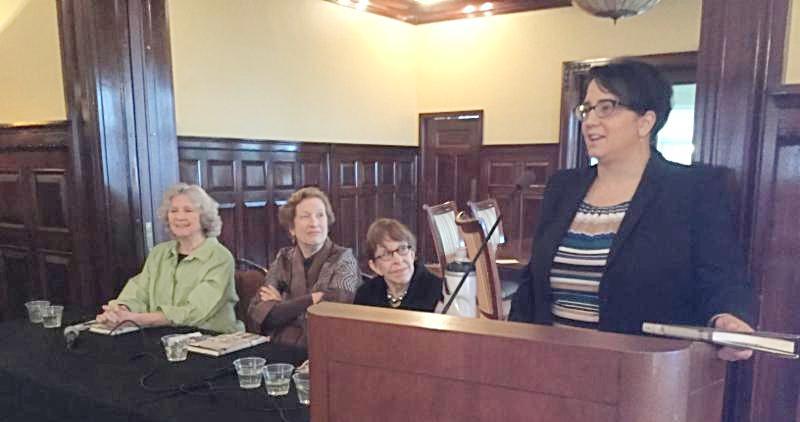WWHP co-sponsored the book launch of Politics of the Pantry: Housewives, Food, and Consumer Protest In Twentieth-Century America by WWHP board member, Emily E. LB. Twarog, Assistant Professor of Labor Studies and American History in the School of Labor and Employment Relations at the University of Illinois at Urbana-Champaign. The event took place at the Women and Leadership Archives at Loyola University Chicago on November 18, 2017.

What image does the word “housewife” conjure up for you? The dictionary defines the word as “a married woman whose main occupation is caring for her family, managing household affairs, and doing housework.” The connotation is a tame person, in a caring position; it is not associated with political activism.
Researching consumer protests for her book Politics of the Pantry, Emily Labarbera-Twarog recognized that housewives who were often charged with managing the household money entered the public sphere as consumers. Working-and-middle-class women were concerned with making household money go as far as possible. Concerned that food prices were increasing their cost-of-living to the point that it impacted their family’s well being, they protested. It began with meat boycotts, as early as 1902 and continued through to the 1960s.
Later consumer protests fought for transparency of the goods sold in grocery stores. How could the consumer know the date when an item was put on the shelf? Which items were already spoiled when they were sold? It was in this phase of Labarbera-Twarog’s research that she interviewed the panelists at the book launch: Lynn Heidt, Jackie Kendall, and Bonnie Wilson, all of whom had interesting and lively stories about their activism.
Lynn Heidt had some previous experience with the grape boycott but her activism began when she found sour milk, out of date, at the National Tea grocery store. As this group of women found each other, and Representative Jan Schakowsky was one of them, they learned to decode the symbols printed on the food packages to discover their expiration dates. They were the “Code Breakers.”
The code breakers eventually developed a “codebook” to decipher expiration dates that they sold nationwide at 50 cents a piece. They protested at stores; they spoiled out-of-date food so it could not be sold; they managed to obtain interviews on national radio and TV to discuss their concerns; and they even bought a share in National Tea to be able to shout questions at National Tea’s president at a shareholders meeting.
National Tea was so rattled by their collective work that it hired a major law firm to investigate them, “spy” on them, and called the husbands of two of the women asking why “they could not control their wives.” This grassroots activism provided the vehicle to launch these women into the public sphere, as office holders at different levels of government and as leaders of national and community organizations.
Emily Labarbera-Twarog has donated their lengthy interviews to the Women and Leadership Archives housed in Piper Hall. Archivist Nancy Freeman, who welcomed the audience, thanked Labarbera-Twarog for those donations and encouraged audience members to consider donating their papers as well. The audience filled Piper Hall. They asked questions of Emily and the panel and stayed afterwards for refreshments and further discussion.
